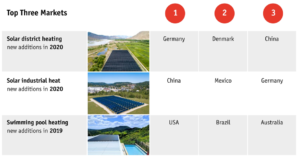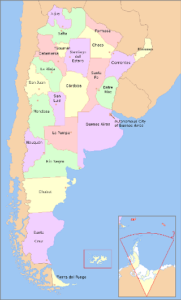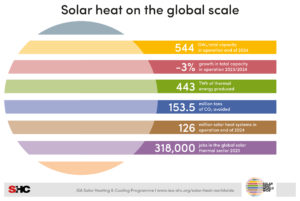Argentina: NGO Promotes Solar Water Heaters in Social Housing
January 24, 2012
 One organisation to promote solar water heaters in Argentina is the NGO Forum for Social Housing and Energy Efficiency (Foro de Vivienda Social y Eficiencia Energética, FOVISEE). The first 33 solar systems have already been installed in a social housing project in Moreno, a district of the country’s capital Buenos Aires. In the long term, FOVISEE aims to install 100 systems in the district – and is looking for a partner which will help finance the project. The photos show a family in Moreno who benefited from a solar water heater set up on their roof.
One organisation to promote solar water heaters in Argentina is the NGO Forum for Social Housing and Energy Efficiency (Foro de Vivienda Social y Eficiencia Energética, FOVISEE). The first 33 solar systems have already been installed in a social housing project in Moreno, a district of the country’s capital Buenos Aires. In the long term, FOVISEE aims to install 100 systems in the district – and is looking for a partner which will help finance the project. The photos show a family in Moreno who benefited from a solar water heater set up on their roof.
Photo: FOVISEE
FOVISEE does not only want to install solar water heaters, but create “Argentina’s first energy-efficient neighbourhood”, as they announce on their website. The project is called “Proyecto 100” and is the follow-up project of “10 casas por + energia” (10 houses for more energy).
The first phase involved retrofitting the houses of ten families in the social housing area La Perla in Moreno to improve their energy efficiency. Still: “The programme’s focus is on training lessons. Together with us, families learn how to use energy in their house in a sustainable way. Then, we install the solar system,” says María Fernanda Miguel, project coordinator at FOVISEE. The installed solar systems are natural circulation systems, designed to provide 70 to 80 % of annual hot water demand. Low-income families will benefit the most from the solar potential: Usually, they are not connected to a gas grid and have to buy bottled gas, which costs around 0.30 USD/kWh – about five times as much as gas from the grid. In addition, many of those families do not have gas boilers, but heat water on the stove, which results in even higher energy costs. If they have electric water heaters, the energy cost is only around a tenth of the gas bottle price (around 0.03 USD/kWh) – but these electric water heaters are often a safety problem.
The ten houses were also equipped with new curtains and mosquito nets, so that the windows will be used more frequently in the future. Many families did not have curtains. To maintain some privacy, they kept the shutters closed all day or even painted the windows black, which resulted in high electricity costs. Now, the homes have white curtains to let the light through, but still prevent people from looking into the rooms. Retrofitting the first ten houses was completed in summer 2010, saving the chosen families up to 50 % of their gas and electricity costs.
The next phase of the programme involved another 23 houses, whose residents also received training in the effective use of the set-up solar heating systems. This latest phase of the project was financed by utility company Edenor and the German embassy. The other project partners are CIHE (Centro de Investigación Hábitat y Energía), IDUAR (Municipality of Moreno) and INTI (National Institute of Industrial Technology).
FOVISEE considers the participating families important partners in continuing the project. An on-going monitoring and research programme will accompany them, in order to learn about hot water consumption patterns in low-income housing and to find out how the improved homes influence the families’ lives in the long term.
The installed solar systems have been produced by Argentine companies Energe, Ñuke, Vademarco, Innovar and Cenit Solar. The latest phase also included some Chinese systems. According to FOVISEE, the idea is to test different systems, as well as promote different companies.
FOVISEE is trying to make solar water heaters and energy efficiency measures an integral part of the national social housing programme. Domestic natural circulation systems, such as the ones used in Moreno, cost around ARS 7,000 (EUR 1,300) each. The price for the Chinese systems is about half as much. However, FOVISEE does not regard the cost factor as the only problem to establish the technology. It is as much a question of how government authorities can learn to trust in a technology which seems exotic for them. “At the moment, alternative energies are neither used nor promoted much in Buenos Aires, and even less in case of low-income families. We like to change that,” Fernanda says. In seeking alternatives to government funding, FOVISEE is working on a micro-credit concept, so families could afford their own solar systems. The organisation is also applying for funds from global programmes.
FOVISEE: http://www.fovisee.com
Energe: http://www.energe.com.ar
Ñuke: http://www.productosnuke.com.ar
Vademarco: http://www.vademarco.com.ar
Innovar: http://www.innovarsrl.com.ar
Cenit Solar: http://www.cenitsolar.com.ar


